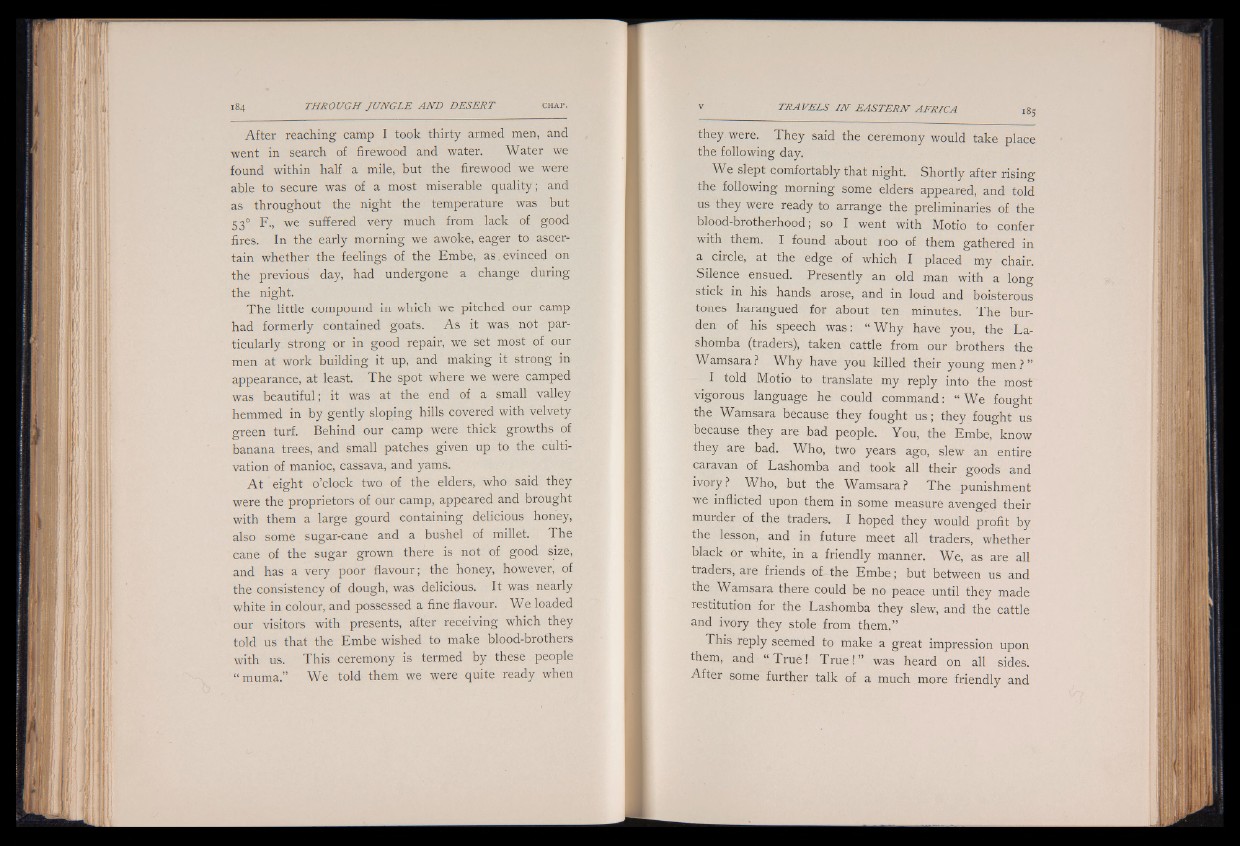
After reaching camp I took thirty armed men, and
went in search of firewood and water. Water we
found within half a mile, but the firewood we were
able to secure was of a most miserable quality; and
as throughout the night the temperature was but
530 F., we suffered very much from lack of good
fires. In the early morning we awoke, eager to ascertain
whether the feelings of the Embe, as . evinced on
the previous day, had undergone a change during
the night.
The little compound in which we pitched our camp
had formerly contained goats. As it was. not particularly
strong or in good repair, we set most of our
men at work building it up, and making it strong in
appearance, at least. The spot where we were camped
was beautiful; it was at the end of a small valley
hemmed in by gently sloping hills covered with velvety
green turf. Behind our camp were thick growths of
banana trees, and small patches given up to the cultivation
of manioc, cassava, and yams.
A t eight o’clock two of the elders, who said they
were the proprietors of our camp, appeared and brought
with them a large gourd containing delicious honey,
also some sugar-cane and a bushel of millet. The
cane of the sugar grown there is not of good size,
and has a very poor flavour; the honey, however, of
the consistency of dough, was delicious. It was nearly
white in colour, and possessed a fine flavour. We loaded
our visitors with presents, after receiving which they
told us that the Embe wished to make blood-brothers
with us. This ceremony is termed by these people
“ muma.” We told them we were quite ready when
they were. They said the ceremony would take place
the following day.
We slept comfortably that night. Shortly after rising
the following morning some elders appeared, and told
us they were ready to arrange the preliminaries of the
blood-brotherhood; so I went with Motio to confer
with them. I found about 100 of them gathered in
a circle, at the edge of which I placed my chair.
Silence ensued. Presently an old man with a long
stick in his hands arose, and in loud and boisterous
tones harangued for about ten minutes. The burden
of his speech was: “ Why have you, the La-
shomba (traders), taken cattle from our brothers the
Wamsara ? Why have you killed their young men ? ”
I told Motio to translate my reply into the most
vigorous language he could command: “ We fought
the Wamsara because they fought u s ; they fought us
because they are bad people. You, the Embe, know
they are bad. Who, two years ago, slew an entire
caravan of Lashomba and took all their goods and
ivory? Who, but the Wamsara? The punishment
we inflicted upon them in some measure avenged their
murder of the traders. I hoped they would profit by
the lesson, and in future meet all traders, whether
black or white, in a friendly manner. We, as are all
traders, are friends of the Embe; but between us and
the Wamsara there could be no peace until they made
restitution for the Lashomba they slew, and the cattle
and ivory they stole from them.”
This reply seemed to make a great impression upon
them, and “ True! T ru e !” was heard on all sides.
After some further talk of a much more friendly and